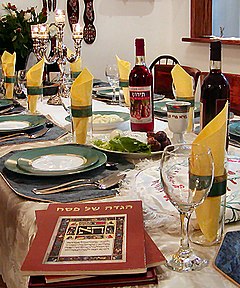| Passoverחַג הַפֶּסַח | |
|---|---|
 A table set up for a Passover Seder | |
| Official name | Pesach – Hebrew: פסח, romanized: Pesaḥ |
| Type | Jewish (religious and cultural) |
| Significance |
|
| Celebrations | Passover Seder |
| Begins | 15 Nisan |
| Ends | 21 Nisan (22 Nisan in traditional Diaspora communities) |
| Date | 15 Nisan, 16 Nisan, 17 Nisan, 18 Nisan, 19 Nisan, 20 Nisan, 21 Nisan, 22 Nisan |
| 2023 date | Sunset, 5 April – nightfall, 13 April (8 days) |
| 2024 date | Sunset, 22 April – nightfall, 30 April (8 days) |
| 2025 date | Sunset, 12 April – nightfall, 20 April (8 days) |
| 2026 date | Sunset, 1 April – nightfall, 9 April (8 days) |
| Related to | Shavuot ("Festival of Weeks") which follows 49 days from the second night of Passover. |
Passover, also called Pesach (/ˈpɛsɑːx, ˈpeɪ-/;[1] Biblical Hebrew: חַג הַפֶּסַח, romanized: Ḥag hapPesaḥ, lit. 'Pilgrimage of the Passing Over'), is a major Jewish holiday and one of the Three Pilgrimage Festivals. It celebrates the Exodus of the Israelites from slavery in Egypt.[2]
According to the Book of Exodus, God commanded Moses to tell the Israelites to slaughter a lamb and mark their doorframes with its blood, in addition to instructions for consuming the lamb that night. For that night, God would send the Angel of Death to bring about the tenth plague, in which he would smite all the firstborn in Egypt. But when the angel saw the blood on the Israelites' doorframes, he would pass over their homes so that the plague should not enter (hence the name.) The story is part of the broader Exodus narrative, in which the Israelites, while living in Egypt, are enslaved en masse by the Pharaoh to suppress them; when Pharaoh refuses God's demand to let them go, God sends ten plagues upon Egypt. After the tenth plague, Pharaoh permits the Israelites to leave.[3]
This story is recounted at the Passover Seder by reading the Haggadah. The Haggadah is a standardized ritual account of the Exodus story, in fulfillment of the command "And thou shalt tell [Higgadata] thy son in that day, saying: It is because of that which the LORD did for me when I came forth out of Egypt."[4]
Pesach starts on the 15th day of the Hebrew month of Nisan, which is considered the first month of the Hebrew year. The Rabbinical Jewish calendar is adjusted to align with the solar calendar in such a way that 15 Nisan always coincides with Sunday, Tuesday, Thursday, or Saturday. The Hebrew day starts and ends at sunset, so the holiday starts at sunset the day before. For example, in 2024, 15 Nisan coincides with Tuesday, April 23. Therefore, Pesach starts at sundown on Monday, April 22.
- ^ "Pesach" Archived November 30, 2014, at the Wayback Machine. Random House Webster's Unabridged Dictionary
- ^ "What is Passover? – Learn All About the Passover Holiday". Tori Avey. March 4, 2012. Archived from the original on October 18, 2021. Retrieved October 18, 2021.
- ^ Exodus 12:27
- ^ "Exodus 13:8". Archived from the original on March 8, 2021. Retrieved April 7, 2021.